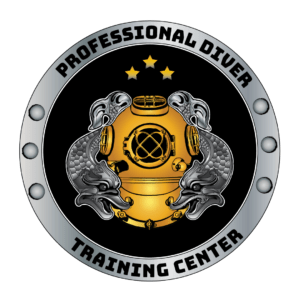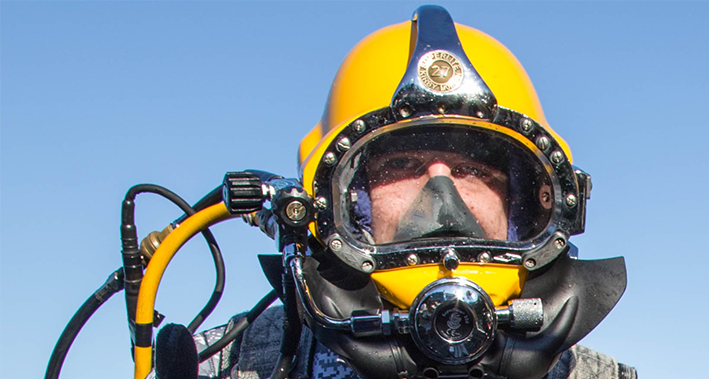Your First Year of Commercial Diving


Written by PDTC
You’ve done the training, the lecture and lab hours are behind you, the tank hours are racked up, you’ve graduated, and it’s time for your first year of commercial diving. But every place you go they want to hire you as a Diver Tender, and not a solo diver. What’s up, did you just waste your time getting this degree just to be at a real diver’s beck and call? Well, there are actually some pretty strong reasons that fresh graduates don’t jump right into solo diving, all of which have to do with keeping you alive, which, let’s face it, you need to be if you want to perform your first solo dive. So, what is a Diver Tender, and why is it so necessary to be one before diving into the role you’ve trained for? Let’s find out.
The first thing you’ll notice with these job descriptions is the variety of responsibilities you’ll be expected to undertake. A Dive Tender is a member of the topside crew who works closely with the main diver. Before the dive even starts, the tender checks the diver’s equipment and topside air supply to make sure it’s fully functional and operating efficiently. After dressing the diver and helping them into the water, their sole focus becomes vigilantly tending to the diver’s safety. They must check the lines and eliminate any excess slack or tension, exchange line-pull signals with the diver,
keep the Diving Supervisor informed of the line-pull signals and amountof diving hose/tending line over the side, all while remaining alert for any signs of an accident or emergency. Add to this list the need to know every possible way the dive can go wrong and have a few backup plans in place, you’ve got quite a list of responsibilities. The point of all this, if not at first apparent, becomes clearer when viewing this job as a long-term career as opposed to a short-term means to a financial end. If you want to make it as a commercial diver in the industry then you must:
Know Your Field Equipment Like the Back of Your Hand.
Performing the function of dressing the diver and making sure their suit is secured so many times before your own dives allows you to become incredibly familiar with the process, procedure, and all relevant pieces of dive gear from head to toe. Now, if an emergency occurs with any one part, you would be able to quickly identify the problem, report it to your tender, and allow yourself to prevent a small equipment mishap from turning into a life-threatening emergency.
Be Able to Remain Calm During an Emergency.
There’s no telling how many times throughout history people’s ignorance in the face of an emergency led to panic and fear-based responses that ended up narrowing their ability to think and perform and led to deaths of themselves and even to others. Having been tasked with the responsibility of planning for as many potential emergency situations and creating backup plans will make your responses in the faces of these emergencies much calmer, balanced, and level-headed. Absorbing this lesson at the beginning of your diving career prior to getting in the water is paramount and makes sure that you will never endanger the life of yourself or your crew when confronted with life-threatening situations.
Leave Your Ego at The Door.
While it’s true that being great at your job requires confidence, willingness, and determination, these attributes can sometimes be linked to one of the biggest risk factors in your career. A giant ego. Performing Diving Tender responsibilities for months, and sometimes years before your own dive is a humbling experience. Showing up to help divers who’ve been in the field familiarizes you with the fact that, even with great training and a go-getter attitude, there is just no possible way to know what you will face in the field. These people know exactly what they face and, if you are a good listener, you can learn a lot from experienced commercial divers that could not just help you progress quickly up the chain of command, but it could also save your life or someone else’s. Commercial Diving may look like a solo or a two-man job, but it is in fact a team effort. If you’re able to leave your ego at the door and listen to the experiences of those you serve as Tender, you will find yourself far more competent in the field, far faster than many of your peers.
Becoming a Diver Tender may not be what you had imagined your first year of commercial diving looking like, but it is, in fact, an extremely necessary step. Being a Diver Tender teaches you the ins and outs of the gear, allows you to learn the proper emergency response protocols before they threaten your life, and it breaks down one of the biggest barriers of being the best at your job, an over-inflated ego. With all this in mind, it is easy to see how this small delay in getting that coveted dive time under your belt will actually allow you to be successful as a long-term commercial diver.
Related Articles
Related
Underwater Welding Equipment: Commercial Diving Tools Part Two
If you read part one of our underwater power tools series, you may have noticed one important tool set missing from the list: Underwater Welding Equipment. These are one of the most utilized sets of equipment in commercial diving and deserve an introduction all their...
Commercial Diving Tools: Part One
You’re interested in becoming a commercial diver. You’ve already read up on the basic equipment you’ll be using like helmets, wetsuits, gloves, and boots, but what about the bigger, heavier equipment like power tools? It might surprise you to learn that there are...
Business is Booming: The Growth of the Commercial Diving Industry
If you’ve recently been finding yourself more interested in becoming a commercial diver, you’re not alone. Becoming a commercial diver may only require a comparatively short period of education, but there are a wide variety of occupations this certification opens...
Follow Us
Subscribe For Updates & Offers
GET THE LATEST NEWS AND UPDATES ABOUT PRO DIVER TRAINING CENTER. PLUS WE’LL KEEP YOU INFORMED ON ALL THE LATEST TRENDS, TOOLS, AND TECH HAPPENING IN THE COMMERCIAL DIVING INDUSTRY.


